At this point, it is almost impossible to find a one-word domain name that is still available. A two-word domain name is rare, and even if they are available, most of them are expensive.
So, in this article, I want to share with you:
- My thought process on how I brainstorm unique and catchy domain name ideas that are available for you to buy without breaking the bank.
- The 6 elements of a good domain name for your blog.
💡 In case you haven’t decided on your niche yet, or you are not confident that your niche is good enough, click here. Please, do not be hasty to buy a domain name thinking that someone else will snatch it away from you. You will regret it later.
How to brainstorm unique and catchy domain names?
There are many methods to find unique domain names, but I want to share with you the method that worked well for me.
You see, when I was employed as a corporate secretary for an international trust fund company, one of my job responsibilities was to think of unique, creative, and relatable company names to incorporate.
If the company names were not attractive enough, they will not be sold and will be shelved forever. In other words, my company waste money incorporating those companies. So, it is a critical job, but I haven’t had problems with those companies I incorporated.
The method that I use to find company names can be applied to finding good domain names as well.
If you prefer to watch a video…
The best way to explain my thought process is to walk you through an example. Let’s say that I am interested to start a fishing blog.
Disclaimer: I have absolutely no idea about fishing. I am not passionate or interested about it. I merely choose fishing for the purpose of an example. You should never choose a niche that you are not passionate about.
Step 1: Coming up with a list of words related to your niche
Here are some brainstorming tips I would like to share:
- Jot down the ideas
- Use Thesaurus
- Do a search on Google
- Visit forums related to your niche
- Leverage on Facebook
Tip 1: Jot down the ideas
The first to everything is as simple as jotting down the ideas that you already have. I know, I sound like I am stating the obvious. What value am I giving, right? Lol!
Wait for it! It’ll get better.
Now, starting a list of words related to your niche is a very important step for my approach, and you will know why in just a little.
It will save you a ton of time, and you’ll have a systematic approach to brainstorm cool domain name ideas.
But, for the purpose of the fishing blog example, I am not a fisherman, I don’t know anything about it, I don’t understand my audience at all!
But, through the brainstorming tips I’ve shared below, I was able to come up with a list of related words and phrases.
| Bait | Bucktails | Cast | Crank |
| Coho | Crappie | Etiquette | Filet |
| Finesse fishing | Gills | Grub and Jig head | Glowing green scales |
| Hooked | Jigging | Jerk bait | Lake Steak |
| Live liner | Lures | Lunker | Musky |
| Paddle Tails | Reel | Red-tails | Reeds |
| Rig | Rod | Slab | Swim baits |
| Wahoo | Walleye |
Let me show you how it works.
Tip 2: Use Thesaurus
As you know, I am totally new to the fishing niche, so the first thing I did was to search “Fishing” on Thesaurus.com.

From here, I’ve identified quite a few interesting words like “angling”, “fly-fishing”, “piscary”, “trawling”, etc.
I don’t know what “piscary” or “trawling” mean, so I’ll do a search “define piscary” and “define trawling” on Google.
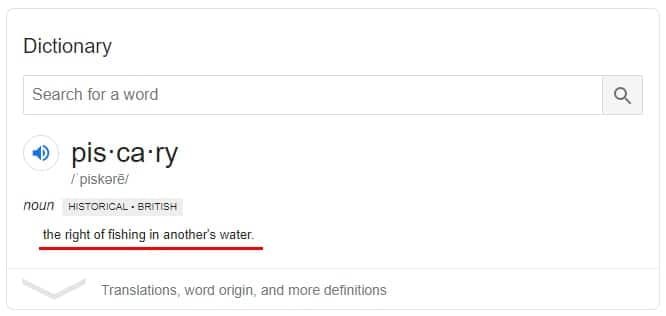
If I am creating a political website about fishing, then maybe this word will be more relevant, but I am creating a blog about the passion for fishing, so for this word, I will skip.
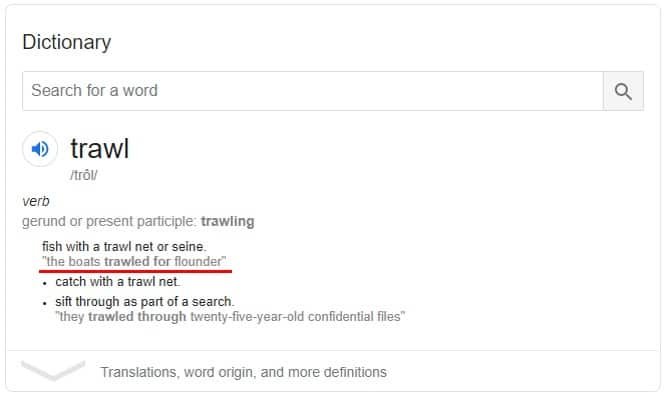
Well, that’s not exactly what I am looking for. Unless I am creating a blog about mass fishing for profits or industrial fishing, then this word may be relevant. So, I’ll pass on this.
Next, from the image above, the word “flounder” seems interesting, I’ll find the meaning of it as well to see if it fits my intended niche.
Next, I’ll do a search on “define angling”.

The word “angling” is exactly what I am looking for. I’ll put it in the list of name ideas.
So, here’s a summary of what you need to do. During your research, whatever new and interesting words you found, put them on thesaurus.
Then, with the results, search the meaning of each word on Google, and see if it fits your niche.
Along the way, you’ll find more and more interesting words. Go through the same process over and over again until you can’t find any new words.
Tip 3: Read articles related to your niche
As I tout again jokingly, I still have no clue what the fishing niche is about.
Step 1: visit answer the public
I don’t know what topics or keywords my audience will search for on Google. So, I will go to a website called “answer the public” and search for a generic keyword.
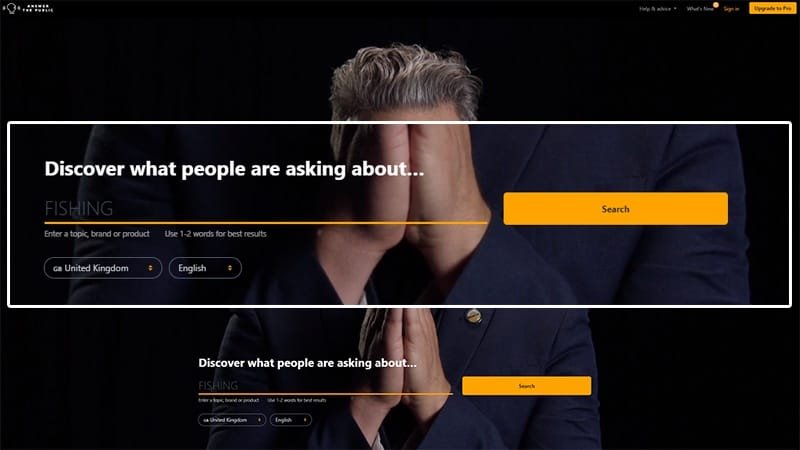
And, here’s the result.
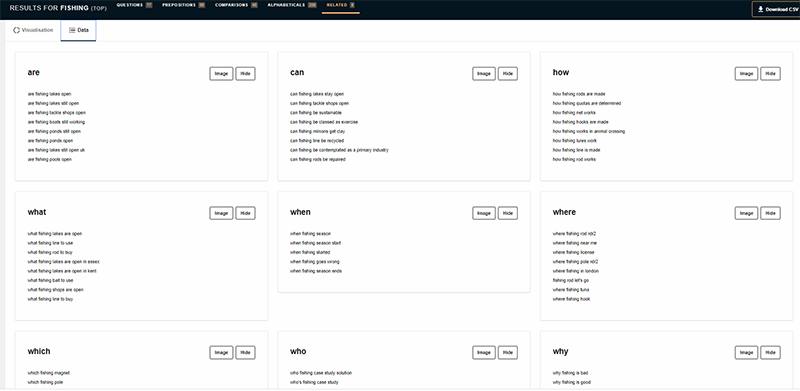
Step 2: pick out some interesting keywords and search them on Google
Open up a few articles and start reading. I am pretty sure you will pick up some interesting words related to your niche.
On those articles, scroll down to the bottom and read the comments (if any). Jot down as many interesting words as possible.
Then, go through the thesaurus process again.
Tip 4: Visit Quora

Quora is a simply a question and answer forum. People will post questions on Quora, and it’s users (some experts in the field), will answer them.
So, because of such a unique engagement, you’ll often find many unique words, phrases, or slang, used by people in a particular niche.
What you need to do? Copy some queries from answer the public and search them on Quora.
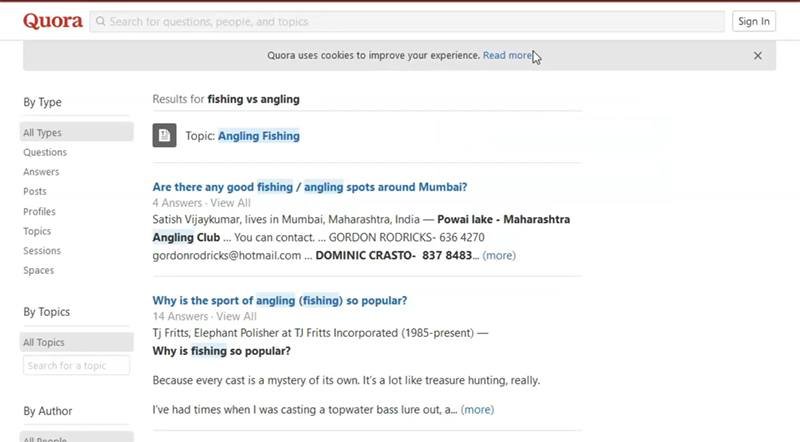
Similarly, click through some questions on Quora, read them, pick up some interesting words, and work the thesaurus process again.
Tip 5: Use Reddit
Reddit is a powerful tool for research because for almost every topic in the world, there are enthusiasts who will voice their opinion. With that, its golden for researchers like me to understand the niche better.
What you need to do? Search “a keyword related to the niche + reddit”.

You’ll find many results on Google. Click through to a few of them and read the comments, especially those that has a lot of replies.
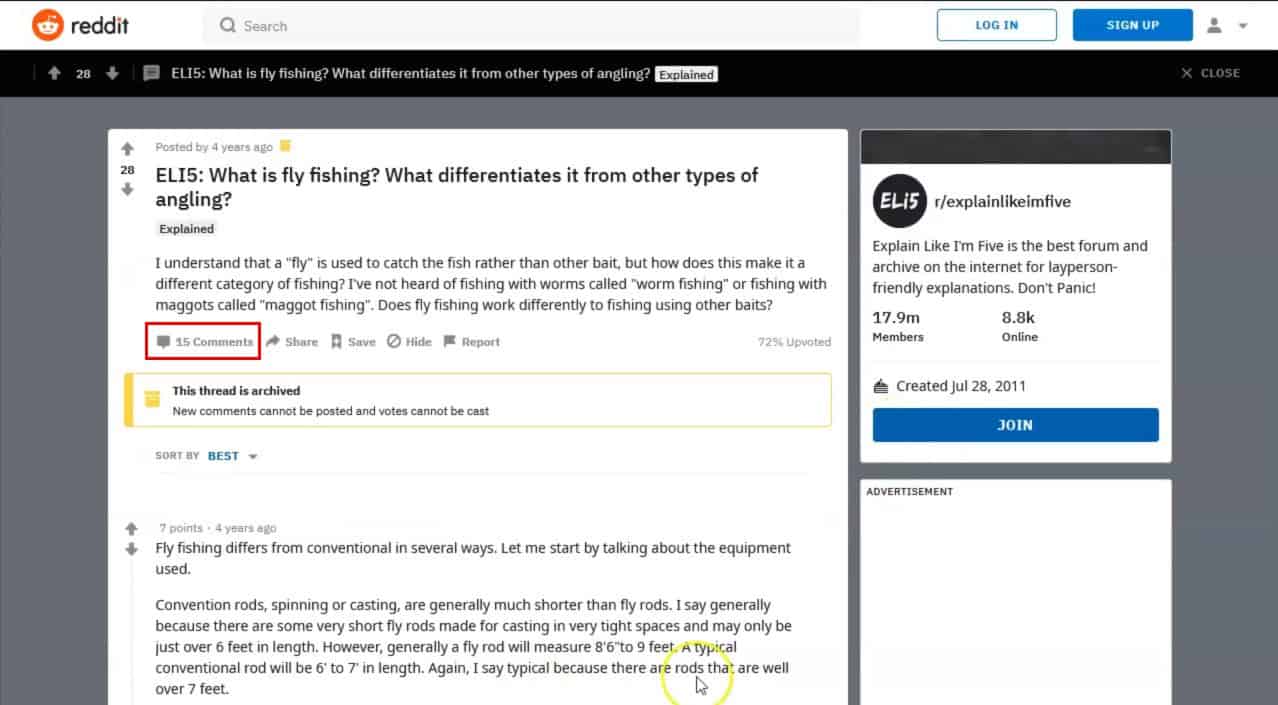
Pick out interesting name ideas, words or phrases you can find. Jot them down and work the thesaurus again. It’s repetitive I know, but it is effective.
Tip 6: Use Facebook
You can use the search function, and it will produce lots of results.
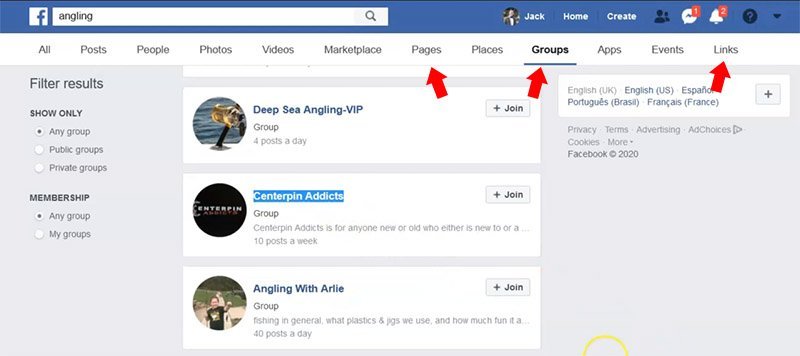
What we are looking for are:
- Pages
- Groups
- Links
What you need to do? You will see many interesting page and group names. Some of them do not have a dot com. You can use their group name and buy the dot com domain.
Or, you can do the same with Quora and reddit. Visit the links on Facebook, read the articles, pick up interesting words, and work the thesaurus process.
Step 2: Mash words up
With the list I’ve mentioned in Step 1, we can start mixing and matching them.
Tip 1: Mash words within the list
Here are some words I’ve mashed:
- Hooked lunker
- Hooked and jiggling
- Reeling angler
- Anglers rig
- Big slab lunker
- Cast etiquette
- Jiggling rod
Put them together and you will have something like hookedlunker.com.
Tip 2: Mash with descriptive words
Here are some modifier ideas:
- Weird
- Strange
- Scout
- Detective
- Explorer
- Aspiring
- Finesse
Mashed with descriptive words:
- Weird angler
- Strange baits
- Reel explorer
- Filet scout
- Filet detective
- Aspiring angler
- Finesse angler
Tip 3: Mash with characteristic words
Modifier ideas:
- Barefoot
- Bad ass
- Rebel
- Ambitious
Mashed with characteristic words:
- Barefoot angler
- Bad ass angler
- Bad ass caster
- Walleye rebel
- Rebel coho
Tip 4: Mash with action words
Modifier ideas:
- Buster
- Tapped out
Mashed with action words:
- Rod busters
- Reel buster
- Tapped out gills
Tip 5: Mash with community words
Modifier ideas:
- Society
- Club
- Group
Mashed with community words:
- Reeler society
- Baiting society
- Castclub
- Reeling club
- Jerk bait group
Tip 6: Use your name
Example:
- Reeling with Jack
- Jacks jiggling rod
- find lunker with Jack
Tip 7: Use exact phrase
I’ve picked up some good phrases while doing the research, like:
- Glowing green scales
- Finesse fishing
So you see, there are many ways that you can play with the words you found. I am pretty sure there are more methods. If you have suggestions feel free to leave them in the comments section.
The important point here is you can do whatever mix and match, but the domain name idea needs to make sense to your audience or prompt your audience what your site is about.
Step 3: Use domain name generation tools
The reason why I didn’t start with using domain name generation tools is because I needed a list of words that resonates with the audience.
If I would have used these tools immediately, I wouldn’t have found unique and relatable domain name ideas.
Having said that, you can use the list of word ideas you found and put them into one of these tools:
Step 4: Check availability
Finally, with the list of domain name ideas you have generated from steps 2 and 3, you can now check their availability on sites like namecheap or godaddy.

I am pretty sure you will be able to find some unique and relatable domain names that are available.
6 Guidelines to select a good domain name for your blog?
Now that you have found quite a few domain names that are available, it is time to select the best.
To do that, I have 6 guidelines for you. They are put in order of importance. Number 1 being the most important:
- Are you excited about the domain name?
- Always choose a “.com” domain
- It has to be easy to remember
- Domain name should describe the purpose of your blog
- Should not restrict future developments
- The domain name should be consistent with the brand name across all social media channels.
If you wish to watch the video instead, here it is:
1. Are you excited about the domain name?
In my opinion, this is one of the most important guides.
I speak from personal experience, because I have bought many domain names over the years which I thought were good domain names.
They fit all the criteria mentioned above. They are all “.com” domains, they are easy to remember, and everything.
But, when it comes to the execution, I couldn’t bring myself to even get started.
So, I would say you should always select a domain name that you feel excited or passionate about in creating content for it.
2. Always choose a “.com” domain
The known benefit for having a “.com” domain is that it is common, and it is easier for people to remember and find your blog.
There are many hidden benefits as well. One of which is it builds credibility when someone on social media found your blog through a web browser search.
So, if you are active on a social media channel like Facebook, you will normally have a Facebook page with a brand name.
Although you have the option to leave a link to your blog on your profile page, but some people will search for your brand name with a “.com”.
Like, for example, I have a Facebook page with the name “Income Stream Builders”. Some people will type incomestreambuilders.com on a web browser.
And, if they found my website, and if it provides lots of information and value to them, it is an immediate credibility boost.
That’s why I always recommend a “.com” domain.
If you’ve followed the process I’ve mentioned so far, you should be able to find a unique and relatable “.com” domain name that is available to you.
3. Easy to remember
There are 4 simple ways your domain name is easy to remember.
- Keep it below 15 characters
- Keep it below 6 to 7 syllables
- Avoid using hyphen and numbers
- Do not use words that are hard to spell
Keep it below 15 characters
I know it is easier said than done. Most catchy domain names are already snatched up.
But, I believe that if you follow the process above, you can come up with catchy domain names.
With the same process I’ve shared, I was able to buy a unique domain name “sproutmarketer.com”.
Honestly, there are still lots of unexplored domain names, it is up to you to find them.
Keep it below 6 to 7 syllables
Now, having said that, if you have a domain name that is above 15 characters, but it…
- has a good ring to your brand name
- is easy to pronounce
- resonates with your audience
- easy to remember
Then, over 15 characters is not a big deal.
You see, the more words you have in your domain name, the harder it is to remember, and if the words you choose have many syllables, it gets even harder to remember.
Nowadays, I would say that “.com” domain names with 1 word are almost impossible to find, domains with 2 words are rare, and even if it is available, it will cost you thousands to buy.
But, if you found a domain name with 2 words and it is cheap, that’s awesome.
But, what I want to get across is that nowadays, it is common for domain names to have 3 words. And if your choice of words has 3 to 4 syllables in it, it will be a mouthful for people to pronounce, and it will be hard for them to remember.
For example, “originamiaunity.com”. Although it is 15 characters, but it is 9 syllables long, and it is hard to remember.
So honestly, even if you pick a 3-word domain name with longer than 15 characters, but you keep the number of syllables below 6, I think it is still doable.
Avoid using hyphens and numbers
I do not need to say much about this, because it is obvious. But, one thing I can add is that domain names with hyphen or numbers are usually perceived as spam.
Do not use words that are hard to spell
You don’t to test your audiences’ ability to spell. You want your audience to find your easily.
So, do not use words like:
- Discipline
- Principle or principal
- Exhilarate
- Intelligence
- License or licence
- Maneuver
- Mischievous
You know what I mean. So, keep it as easy as possible for your audience to find you.
4. Domain name should describe the purpose of your blog
The best way to do this is to use some words or phrases that your intended audience will use.
Like, the fishing blog example I used above.
Through reading lots of articles and comments on blogs and forums related to your niche, you will be able to find common words or phrases people use.
So, depending on the direction of your blog, you can use words that describes the purpose of your blog.
5. Your domain name should not restrict future developments
Nobody can predict the future, but you have to prepare for it.
You don’t want to confine your domain name to a very specific niche. You want to leave some room for your website to grow.
For example, if you are interested in talking about baby food, for now, you can buy a domain name like “babydiet.com”.
It is easy to remember and stuff like that, but in future if you wish to talk about baby toys or baby diapers on your blog, then “babydiet.com” may not be that relevant to those topics.
You want to choose something more generic that is relevant to a broader niche. Like for example, “allaboutbaby.com”.
6. Consistent branding
This does not apply to you if you are completely new to blogging and you are building up a brand from scratch. But, just keep in mind that having a brand across all channels will help your audience find you easily.
Now, if you have already an established brand on a social media channel, that’s great! And, if you intend to start a blog, it will be logical for you to buy a “.com”.
However, I understand that someone else has probably bought the “.com” with your brand name. There are 2 options for you:
- buy a “.net” or a “.org” with the same brand name;
- start a new brand and communicate the change with your audience.
It really depends on your situation. Just do not buy a “.xyz”, “.website”, or anything other than the mentioned.
There you have it! The 6 guidelines (or 5 for new bloggers) to select a good domain name.
You can run through you list of possible domain names and see which is the best domain name for your blog.
Where to buy a domain name?
There are 2 domain registrars I recommend:
Once you’ve purchased a domain name, it’s time for you to set up a blog.
What’s next?
The next thing you need is web hosting.
Honestly, there are many web hosting companies out there, and I have engaged with many of them in the past.
But, the web host I found to be the most reliable, fastest, and value for money is Site Ground.
And, if you use this link (my affiliate link) to sign up to Site Ground, I would like to offer you a bonus as a way to say thank you.
It is a series of over-the-shoulder videos where I’ll walk you through every step of the way to set up your website.
It includes setting up your web hosting, installing the right themes and plugins, as well as designing your website to look professional.
Once you have purchased your web hosting, please send me a message here and I will provide you with link to the bonus.
Your friend,
Jack
Recent Content
9 Best Niche Ideas For Pinterest Affiliate Marketing 2020 & Beyond
If you're looking for ways to start a profitable affiliate marketing business on Pinterest, then this is for you. According to Pinterest Newsroom, the COVID 19 pandemic has caused a significant...
So, you're looking for good ways to generate an income using your ability to speak more than one language? Then this is perfect for you! I took the time and compiled a list of 11 high paying...
